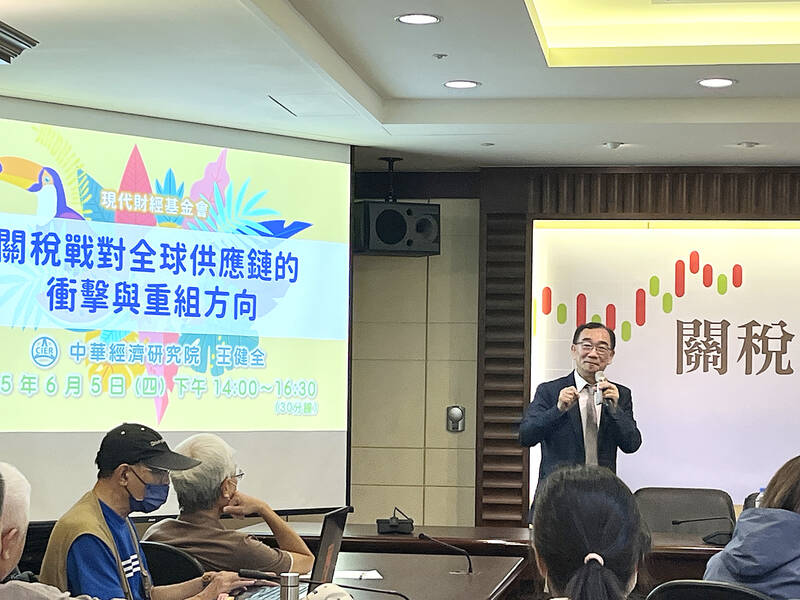Taiwan’s manufacturing sector slid back into contraction territory last month, weighed down by expiring US tariff waivers and volatile exchange rates, the Chung-Hua Institution for Economic Research (CIER, 中華經濟研究院) said yesterday.
The seasonally adjusted manufacturing purchasing managers’ index (PMI) fell 1.4 points to 49.6, below the expansion threshold of 50, signaling a renewed slowdown in industrial activity.
“The decline reflects rising caution among manufacturers as the suspension of US’ ‘reciprocal’ tariff nears expiration,” CIER vice president Wang Jiann-chyuan (王健全) told a news conference in Taipei.

Photo: Hsu Tzu-ling, Taipei Times
Concerns over shipping reliability and delivery lead times also led firms to trim back production and order volume, he said.
Although the PMI remained close to the neutral 50 mark — indicating a subdued rather than sharply declining environment — key components such as export orders and industrial output weakened, pointing to broader sector-wide hesitation, Wang said.
The CIER said geopolitical tensions, particularly between Israel and Iran, drove crude oil prices higher and ended a two-month downtrend in raw material costs for chemical and biotech producers.
However, tepid end-market demand and cautious inventory strategies limited any significant recovery in procurement activity, it said.
Industry performance was uneven, as the electronics, optics and power equipment sectors remained in expansion mode, but textiles, apparel and transportation-related industries contracted, hampered by shifting supply chains and currency volatility, the CIER said.
Wang flagged the appreciation of the New Taiwan dollar against the US dollar as a growing concern, pointing out that each 1 percent rise in the local currency typically erodes corporate revenue or profits by 0.1 to 0.5 percentage points.
Taiwan Semiconductor Manufacturing Co (台積電), the world’s top contract chipmaker, has reported foreign exchange-related losses — a signal that broader impacts could soon ripple beyond the technology sector, Wang said.
Taiwan’s relatively shallow foreign exchange market, with daily turnover of just US$1 billion to US$2 billion, makes it vulnerable to outsized moves, he said, urging central bank intervention to prevent further disruption — especially amid ongoing US tariff negotiations.
In contrast, the nation’s non-manufacturing sector continued to gain momentum.
The non-manufacturing index rose 2.4 points to 54.3 last month, buoyed by a TAIEX rebound and solid commercial property demand — particularly in emerging hubs such as Taipei’s Beitou-Shilin Technology Park (北投士林科技園區), where Nvidia Corp is looking to open new offices and expand operations.
New high-end housing projects and ongoing data center construction fueled a 23.1-point surge in commercial activity for the construction and real-estate sectors, the CIER said.
Financial services also benefited from stronger investor sentiment, Wang said.
However, retail and hospitality remained in contraction despite a strong NT dollar and reduced outbound travel to Japan.
“The seasonal boost we usually expect has yet to appear,” Wang said, citing subdued tourism demand and lower vehicle sales.

In Italy’s storied gold-making hubs, jewelers are reworking their designs to trim gold content as they race to blunt the effect of record prices and appeal to shoppers watching their budgets. Gold prices hit a record high on Thursday, surging near US$5,600 an ounce, more than double a year ago as geopolitical concerns and jitters over trade pushed investors toward the safe-haven asset. The rally is putting undue pressure on small artisans as they face mounting demands from customers, including international brands, to produce cheaper items, from signature pieces to wedding rings, according to interviews with four independent jewelers in Italy’s main

Macronix International Co (旺宏), the world’s biggest NOR flash memory supplier, yesterday said it would spend NT$22 billion (US$699.1 million) on capacity expansion this year to increase its production of mid-to-low-density memory chips as the world’s major memorychip suppliers are phasing out the market. The company said its planned capital expenditures are about 11 times higher than the NT$1.8 billion it spent on new facilities and equipment last year. A majority of this year’s outlay would be allocated to step up capacity of multi-level cell (MLC) NAND flash memory chips, which are used in embedded multimedia cards (eMMC), a managed

Japanese Prime Minister Sanae Takaichi has talked up the benefits of a weaker yen in a campaign speech, adopting a tone at odds with her finance ministry, which has refused to rule out any options to counter excessive foreign exchange volatility. Takaichi later softened her stance, saying she did not have a preference for the yen’s direction. “People say the weak yen is bad right now, but for export industries, it’s a major opportunity,” Takaichi said on Saturday at a rally for Liberal Democratic Party candidate Daishiro Yamagiwa in Kanagawa Prefecture ahead of a snap election on Sunday. “Whether it’s selling food or

In the wake of strong global demand for AI applications, Taiwan’s export-oriented economy accelerated with the composite index of economic indicators flashing the first “red” light in December for one year, indicating the economy is in booming mode, the National Development Council (NDC) said yesterday. Moreover, the index of leading indicators, which gauges the potential state of the economy over the next six months, also moved higher in December amid growing optimism over the outlook, the NDC said. In December, the index of economic indicators rose one point from a month earlier to 38, at the lower end of the “red” light.